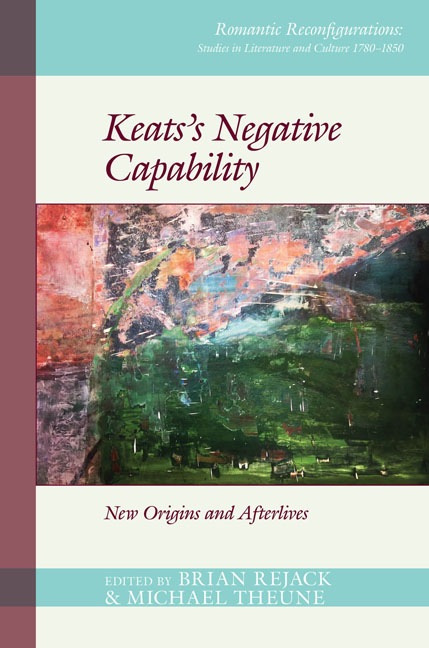Book contents
- Frontmatter
- Contents
- List of Figures
- Acknowledgments
- List of Abbreviations
- List of Contributors
- Preface
- Introduction: Disquisitions: Reading Negative Capability, 1817–2017
- Part I ‘swelling into reality’: New Contexts for Negative Capability
- Part II ‘examplified throughout’: Forms of Negatively Capable Reading
- Part III ‘pursued through Volumes’, Volume I: Negative Capability in Twentieth- and Twenty-First-Century American Poetry
- Part IV ‘pursued through Volumes’, Volume II: Adaptations, Appropriations, Mutations
- Afterword: Reading Keats's Negative Capability
- Bibliography
- Index
8 - ‘uncertainties, Mysteries, doubts’: Pluralities and the Historical Present in Keats and Hazlitt
- Frontmatter
- Contents
- List of Figures
- Acknowledgments
- List of Abbreviations
- List of Contributors
- Preface
- Introduction: Disquisitions: Reading Negative Capability, 1817–2017
- Part I ‘swelling into reality’: New Contexts for Negative Capability
- Part II ‘examplified throughout’: Forms of Negatively Capable Reading
- Part III ‘pursued through Volumes’, Volume I: Negative Capability in Twentieth- and Twenty-First-Century American Poetry
- Part IV ‘pursued through Volumes’, Volume II: Adaptations, Appropriations, Mutations
- Afterword: Reading Keats's Negative Capability
- Bibliography
- Index
Summary
Why might it matter that when Keats coined his now-famous phrase ‘negative capability’ in 1817 he pluralized the ‘uncertainties, Mysteries, doubts’—those forces of questioning with which the negatively capable mind could remain, as he put it, ‘without any irritable reaching after fact & reason’ (LJK, I: p. 193)? Reading Keats's curiously plural epistolary formulation in relation to his developing poetics, this essay proposes that Keats conceives plurality as a poetic figure crucial to accommodating the complexities of the early nineteenth-century historical moment—that is, a post-Waterloo moment caught between the rise of periodization (with an attendant urgency to name the ‘spirit of the age’) and the temporalities of modernity (the sense of speed and of an unknowable futurity, which made that naming all but impossible). These competing pressures can be felt in the paratactic pluralities of Keats’s phrase—a phrase whose very form helps multiply to an indefinite number the unknown possibilities, while the ‘s’ sounds in Keats's expression, added to the caesural hesitations, extend the line temporally, slowing the reader down. Keatsian historical thinking begins with a slowing down and a dwelling on ‘uncertainties, Mysteries, doubts’.
A Keatsian poetics of slow reading and lateral sideshadowing might not immediately bring to mind the work of a modern historian called on to record the historical dimensions of the age. But when one recalls the letter Keats wrote two years later about the shortcomings of Voltaire and William Robertson's historiography (the 1819 letter on the ‘vale of Soul-making’), the historiographical dimension to Keats's negatively capable, plural poetics becomes more clear. I am arguing, that is, that the dimensions of Keats’s poetry we might associate with negative capability as he formulates it in 1817 are consistent with his more explicit efforts to find a way of imagining the historical present that succeeds where the methods and assumptions of enlightenment historians fail. I begin, therefore, by revisiting the 1819 letter before considering how ‘To Autumn’—Keats's poem perhaps most famously accused of political escapism—engages with historiographical problems of Keats's moment in what might be called a negatively capable historical thinking. For Autumn's wind and breath move about like an elusive ‘spirit of the age’.
- Type
- Chapter
- Information
- Keats's Negative CapabilityNew Origins and Afterlives, pp. 122 - 136Publisher: Liverpool University PressPrint publication year: 2019



